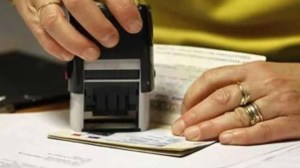RSS skeleton in Cong closet, even BJP is red-faced
RSS chief K S Sudarshan’s statement that the Congress in Kerala had sought and got his organisation’s support in the Assembly elec...

RSS chief K S Sudarshan’s statement that the Congress in Kerala had sought and got his organisation’s support in the Assembly election in 2001 has embarrassed both the Congress and the BJP which has been struggling to find a place on the state’s electoral map.
While the Congress has denied such a deal, the RSS state leadership has confirmed that senior Congress leader Vayalar Ravi had approached it for help in a bypoll and not the 2001 election as its chief stated in an interview.
‘‘Ravi’s overtures, however, were turned down since he insisted on keeping the arrangement discreet,’’ A R Mohanan, state secretary of the RSS told The Indian Express today.
Sudarshan told India Today that his outfit and the BJP had helped the Congress win the 2001 Assembly polls after Ravi approached them, and that the Congress was clobbered in the 2004 Lok Sabha poll because the RSS did not help.
Ravi and the KPCC have hotly denied the charge. While Ravi says he had never, ever, met the RSS leader, and had no business to broker votes since he held no office in the party’s state unit then, KPCC chief Thennala Balakrishna Pillai rejected the idea saying it was ‘‘preposterous.’’
But the RSS leadership is refusing to buy that, and has given a new twist to the controversy. It told The Indian Express that what Sudarshan mentioned were really two different points that got mixed up. One was that Ravi had approached the RSS for votes, for himself — this was while he was contesting the Assembly bypoll from Cherthala in the 1990s. Then later, during the 2001 Assembly poll, the RSS had taken a conscious decision to defeat the CPM, which naturally meant rooting for the Congress. It was a unilateral move.
‘‘Ravi drove down to the State Headquarters of our organisation at Elamakkara in Kochi one night, just before the Cherthala bypoll. He called on our Prantha Pracharak R Hari and requested him to divert our significant strength in Cherthala constituency for him. This was unexpected, and Hari told him that we don’t make political deals under cover of darkness, and told him to come for negotiations if and when his situation allowed him to do that openly,’’ Mohanan said.
Mohan says things were different during the 2001 polls. The bloody battles between the CPM and the Congress were at its peak, and cadres of both were being bombed or hacked to death almost daily. The RSS-BJP combine bore the brunt: some of their key men in north Kerala were killed, and they vowed to keep the CPM out of power.
‘‘Our state leaders debated this at Tripunithura, under the guidance of Mohan Bhagwat and others from the national leadership. We decided to mobilise our entire strength for the Congress candidates to defeat the CPM,’’ he says.
Interestingly, the BJP, which has a 13-per cent vote share in the state now, does not want to appear that it had played along with this RSS design—not even in constituencies where it could greatly help make the Congress win. ‘‘We had nothing to do with it. We were not consulted, and we did not ask our people to do it,’’ claims state BJP president P S Sreedharan Pillai.
Not that the BJP in Kerala had never done that. It is yet to live down the infamy of its Lok Sabha alliance against the CPM in the early ’90s with the Congress and the Muslim League, in Vadakara and Beypore. Though the party later owned it up as a ‘‘strategic aberration,’’ what was more damaging was the confidential report of the BJP’s own official committee which looked into it for the party’s national leadership.
The probe report clearly highlighted how the party’s votes were being diverted by its own local satraps, how even its senior state leaders have been palming off party votes en bloc in return for both money and other considerations, and how the party was getting into clandestine deals.
The BJP has considerable negotiating room in Kerala, considering that the win-lose margin between the two fronts led by the Congress and CPM in Kerala is often less that two per cent of the votes polled. A few thousand BJP votes shifted strategically could alter a poll’s outcome.
Sreedharan Pillai, however, claims that vote diversions don’t happen anymore. ‘‘We have since resolved that there would be no more hijacking of our votes for any party—by anyone. We did not let at least BJP votes go to the Congress in 2001. I can’t talk for our fellow organisations,’’ he maintained.
The CPM, which has repeatedly said that there were clandestine RSS-Cong deal, is delighted as Sudershan’s statement gives them another chance to claim the Muslim vote it has been desperate to get. ‘‘If a senior leader like Ravi has done it, it must have been with the permission of the party leadership. It’s sad that the Congress had to stoop to such levels and it (the deal) shows how secular that party is,’’ said CPM secretary Pinarayi Vijayan.
Photos





- 01
- 02
- 03
- 04
- 05


























